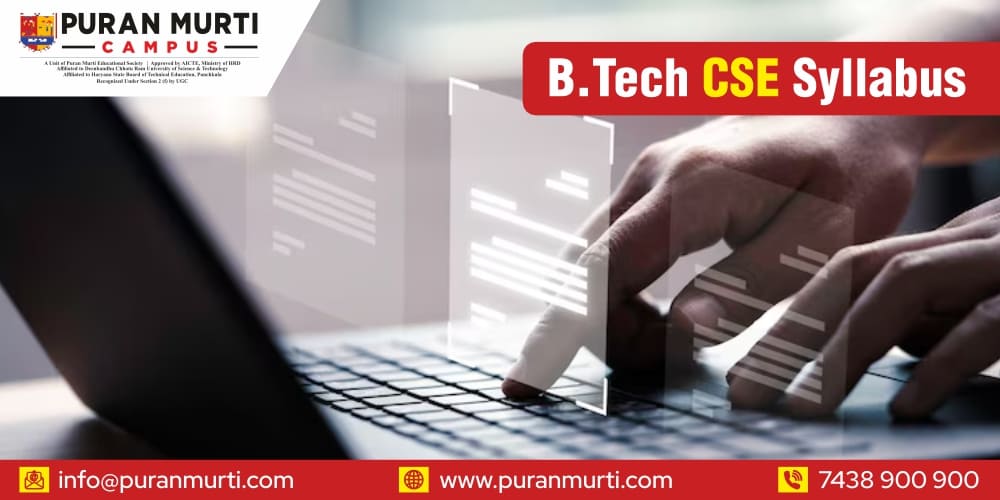btech cse syllabus
Posted on : 12 August, 2025 2:53 pm
If you’re thinking of enrolling in B.Tech in CSE, here’s an extremely friendly step-by-step guide to what you learn semester by semester in Puran Murti campus. Let’s get going on btech cse syllabus.
Course Overview
-
Course Name: Bachelor of Technology in Computer Science & Engineering
-
Duration: 4 Years (8 Semesters)
-
Eligibility: 10+2 with Physics, Chemistry, and Mathematics (minimum 50% marks; entrance exam may apply)
-
Focus Areas: Programming, Data Structures, Algorithms, Databases, Networking, AI, Machine Learning, Cloud Computing, Cybersecurity, etc.
Year 1 (Semesters 1 & 2): Basics to Get into Groove
Semester 1
- Engineering Mathematics I – Calculus, linear algebra, matrices
- Quantum Mechanics for Engineers
- Programming for Problem Solving(C,C++,JAVA)
- English for Technical Writing
- Environmental Science
- Medical Physiology for Engineers
- UHV- I
-
Labs: Quantum Mechanics for Engineers Lab, English for Technical Writing lab, Programming for Problem Solving Lab.
These subjects build your scientific, analytical, and programming base.
Semester 2
- Engineering Mathematics II – Differential equations, transforms
- Chemistry for Engineers
- Economics for Engineers
- Discrete Structures
- Fundamentals of Electrical Engineering
- Basics of Analog & Digital Electronic
- Universal Human Values-I
-
Labs: Chemistry lab, Fundamentals of Electrical Engineering lab, Basics of Analog & Digital Electronic lab.
You’ll balance coding confidence with soft skills and hands-on engineering work.
Year 2 (Semesters 3 & 4): Building Core Technical Skills
Semester 3
- OOP using JAVA
- Digital System Design
- Data Structures & Algorithms
- Database Management Systems (DBMS)
- Computer Organization & Architecture
-
LAB: Digital System Design Lab, Data Structures Lab, OOP using JAVA Lab, Database Management Systems Lab, Community internship
Semester 4
- Operating Systems
- Software Engineering
- Design & Analysis of Algorithms
- Full Stack Development
- Mathematics-III
-
Labs: OS lab, networks, Design and Analysis of Algorithms, Software Engineering, Full Stack Development.
You’ll learn how software is built, protected, and orchestrated—along with a peek at intelligence!
Year 3 (Semesters 5 & 6): Emerging Tech & Specialization
Semester 5
- Data Communication & Microprocessors
- Database Management Systems
- Object Oriented Programming
- Formal Languages & Automata Theory
- Software Engineering
- Program Elective-I
- LAB: Professional Training (Level-2) Seminar Database Management Systems lab,Object Oriented Programming lab
Semester 6
- Program Elective-II
- Program Elective-III
- Compiler Design
- Open Elective-I
- Open Elective-II (Humanities)
-
LAB: Program Elective-II Lab, Compiler Design
Year 4 (Semesters 7 & 8): Advanced Electives & Industry Preparation
Semester 7
- Program Elective IV & V – Pick content area such as Cybersecurity, A/R, V/R, Cloud, Bioinformatics
- Program Elective-VI
- Open Elective-III
- Biology
-
Professional Training Seminar – meeting industry focused soft-skills, teamwork, documentation, Project-I.
You’ll specialize even more and develop transferable employable skills.
Semester 8
- Advanced Computer Architecture – Multicore CPUs, memory optimizations, pipelines
- Software Project Management (Gr. A)
-
Project II / Capstone – Full project lifecycle: implementation, testing, documentation, demo
Wrap up with a substantial project that ties together all your learning—a big win for internships or job interviews, General Fitness for the Profession
What Does This Curriculum Offer that is Unique?
-
A strong core in algorithms, OOP, OS, DBMS, networking, and software engineering
-
Current electives such as AI, ML, cloud, blockchain, IoT, and cybersecurity
-
Industry-relevant labs, project work, and seminars help with practical learning
-
Electives and open courses that allow you to learn about topics that matter to you
-
Emphasis on projects and internship in Years 3 and 4 to help in the transition to the real-world
Rapid Fire Suggestions to Make it Work
-
You have to practice coding- mini projects outside of the curriculum can be very beneficial
-
Use the labs, workshops, and experimentation as a learning fun experience instead of a chore
-
Choose electives that are exciting for you – if you are passionate about it you will learn more earning
-
Take part and participate in as many seminars and presentations – it takes time and practice, but you will grow your confidence immensely
-
Connect with seniors and faculty, having someone there, who can mentor you on the tough parts makes it easier
Final Thoughts
The B.Tech CSE curriculum at Puran Murti campus has been specifically designed so that you can build off what you have done in Year 1, and progress through to more complex, future-thinking topics and project-based work in Year 4.
By the time you graduate, you will have depth in technical knowledge, exposure to real projects, and be employable. This syllabus isn’t just checking boxes—it’s about shaping your identity as a tech creator and problem-solver.
So if you’re interested in programming, innovation, and becoming part of the tech frontier, this is for you. Stay curious, experiment endlessly, and code something you’re proud of you.

